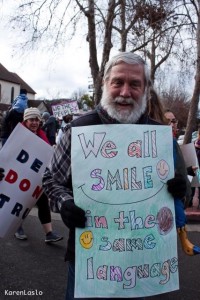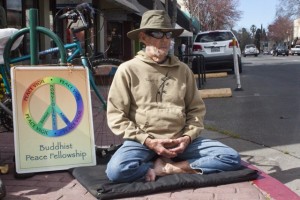by Leslie Layton
A group of Chico residents plan to address the City Council Tuesday to request a “sanctuary” designation for the city – a statement that is important and controversial in an era of harsh immigration enforcement.

Participant in January’s Women’s March on Chico
Elizabeth Alaniz, assistant director of Chico State’s Financial Aid and Scholarship office, said students from several campus groups plan to address the City Council on the issue at the panel’s Feb. 21 meeting. And Chico author and Zen Buddhist Lin Jensen said he has composed a draft resolution for a sanctuary designation after conducting extensive research on the matter.
Hundreds of counties and cities across the country have limited their cooperation with federal immigration authorities in recent years in differing ways; cities like San Francisco, Santa Ana and Oakland have adopted official sanctuary designations. Regardless, many cities and counties now decline to investigate immigration violations or detain individuals on behalf of federal authorities. A few instruct officers not to contact immigration authorities during law enforcement encounters.
Chico City Councilwoman Ann Schwab said Chico State students and other community residents have approached her about a “compassionate city” or sanctuary designation, which she supports. “I have very strong values for honoring diversity,” she said in a telephone interview. “If this is what we can affirm as a city, then we’re stronger economically and the community will be a better place to live.”
Sanctuary-like policies have become more common in response to court rulings, new legislation and the argument that the federal government shouldn’t pass on the costs and burden of immigration law enforcement to municipalities. But proponents also point out that immigrant communities cooperate with and trust in local police more readily if they’re not afraid of detention or deportation.
The adoption of a designation can be a statement that is symbolic, a statement that shapes local policy, or both.
“As I watched this thing unfolding, I realized how difficult and tragic it could be in the lives of people who were genuinely in fear they would be picked up, arrested and deported,” said Jensen, who added that as a Buddhist, “I don’t like to try to get rid of people who are viewed as an inconvenience or are a supposed threat.”
Chico’s sanctuary campaign – if the rumblings become that– comes in response to recent immigration raids across the country; to President Donald Trump’s executive orders for enforcement that would involve local police agencies; and to recent detentions of immigrants, uninvolved in any criminal activity, that have startled and alarmed some communities.
On Feb. 15, for example, officers from Immigration and Customs Enforcement (ICE) arrested a 23-year-old Seattle student who had a work permit and temporary protection from deportation via his enrollment in the previous administration’s Deferred Action for Childhood Arrivals program.

Lin Jensen is sometimes seen meditating
The Immigrant Legal Resource Center (ILRC), a national non-profit organization advocating for immigrant rights, has been receiving requests for help from municipalities across the country that are considering sanctuary designations or examining the policies they have in place. “Many are now looking to see if their policies need to be revised or expanded,” said Lena Graber, a special projects attorney based in San Francisco.
To what extent a sanctuary resolution shapes policy depends on the municipality and what it adopts, Graber said. The ILRC says that a sanctuary declaration can be a “message to the immigrant community that they are welcome,” but needs to have specific policies attached to become more than a political statement.
Councilwoman Schwab said she has drafted a resolution based on ones adopted by the county and city of San Francisco and the city of Nashville, Tenn., as a “starting point.” But she said she wants to see what the community brings forward during the “business from the floor” portion of Tuesday’s City Council meeting.
“The community should be asking for this,” said Schwab. “The council will be more receptive if it knows that a lot of people in the community want this.”
Jensen says he’ll bring forward a “binding resolution” based on the one adopted by the city of Oakland. His resolution states that city leaders and officers will not cooperate with immigration authorities “in the questioning, deportation or detainment” of Chico residents unless there is “reasonable suspicion of criminal activity” beyond immigration status.
Sanctuary policies vary from place to place, with San Francisco having one of the most comprehensive programs. The ILRC’s “Searching for Sanctuary” report says cities can adopt any or all of these steps:
- prohibit officers from asking about immigration status;
- prohibit use of local resources to assist with immigration enforcement;
- refuse to hold individuals for ICE or allow officers to contact ICE during traffic stops;
- refuse to participate in the program that deputizes local officers to act as immigration agents (a program that Trump plans to revive).
“No local government or agency has any legal obligation to use any of its resources” in immigration enforcement, says the ILRC report. “Rather, localities may face liability for enforcing civil immigration laws.”
The report notes that a giant “deportation and detention machine” has been built in recent years and supported by counties across the country that voluntarily cooperate. “That massive infrastructure will now be led by an administration with an even more ambitious nativist agenda,” it warns.
One of Trump’s executive orders calls for cuts in federal funds to sanctuary cities, but immigration experts say the president will face formidable legal challenges in attempting to take punitive measures against uncooperative municipalities. Court rulings generally reflect the view that immigration enforcement is a federal matter.
The Chico City Council meeting will begin at 6 p.m. Feb. 21 in the City Council Chamber at 421 Main St.
Leslie Layton is editor of ChicoSol.
